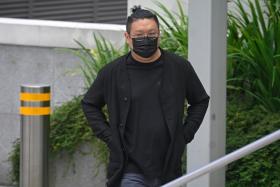Man who co-owns $1.5m condo with mother loses his share after suing her
A man who co-owns a condominium unit with his mother and made all the payments for the property has lost his half-share of the $1.5 million apartment after he sued the widow for her stake.
Mr Cheng Ao, who was 56 during the trial in 2022, contended that Madam Yong Njo Siong, 82, holds her half-share of the Tropical Spring apartment in Simei on trust for him. This would effectively mean he owns the entire property.
Madam Yong counterclaimed against him and argued that the funds he used to pay for the unit had come from her share of the money her late husband Tondo Satrio distributed among the family members.
The High Court ruled in favour of Madam Yong, declaring that she was the sole beneficial owner of the unit, and that Mr Cheng was holding his share of the property on trust for her.
In the written judgment issued last Tuesday, Justice Philip Jeyaretnam said the evidence showed that funds earmarked by Mr Satrio for Madam Yong, and controlled by Mr Cheng, were used directly or indirectly to purchase the unit.
But a counterclaim by Madam Yong for the balance of the 12.75 million yuan (S$2.5 million) her late husband had allocated to her was also dismissed.
Mr Satrio set up Inhwa Tile Products in Xiamen, China. In 1992, he incorporated another company, Inhwa Tile Products in Qingdao, China.
Madam Yong, a housewife who does not understand or speak English, lived with Mr Satrio in China between 1992 and 2019.
The couple had three children. Mr Cheng, their second child, has an older brother, Mr Chen Sie, and a younger sister, Ms Bai Yun.
Mr Cheng moved to Singapore in 2000. He bought a unit at Tropical Spring in 2001 and has since lived there with his wife and children.
In 2011, Mr Satrio received 158 million yuan from the sale of the Qingdao company.
He allocated 45.35 million yuan to himself and Mr Cheng each, and 12.75 million yuan to Madam Yong and Mr Chen each.
That same year, Mr Cheng and Madam Yong purchased a second unit at Tropical Spring for about $1.5 million, and were registered as tenants-in-common in equal shares.
Under a tenancy-in-common, each co-owner holds a distinct share of the property. When one owner dies, his share is passed on to his beneficiaries, instead of being transferred to the surviving owner like in a joint tenancy.
Mr Cheng paid $15,150 for the option to purchase the unit, and he and his wife jointly issued a cheque for $60,600 to exercise the option. He also transferred about $650,000 to his wife’s nephew, who then issued cashier’s orders to the sellers.
Mr Cheng did not live at the disputed unit, but took out a mortgage of $790,000, which he serviced, and paid the property tax, maintenance fees and utility bills.
Madam Yong and Mr Satrio lived in this unit after permanently moving to Singapore in December 2019. Mr Satrio died in November 2021.
In his lawsuit filed in 2022, Mr Cheng, who is represented by Mr Ivan Ng, claimed that he had bought the unit with his share of the funds distributed by Mr Satrio.
He contended that he bought the disputed unit for his own investment or retirement, and permitted Madam Yong to live there.
Mr Cheng said that he had named Madam Yong as the co-owner to assuage her concerns that he would change his mind about letting her live there.
Madam Yong, who is represented by Ms Wong Soo Chih, argued that Mr Satrio’s intention for her to receive 12.75 million yuan is clearly shown by a note dated June 25, 2011, in which he expressed his intention to distribute the proceeds.
She presented an e-mail that Mr Cheng sent to his older brother on Dec 6, 2011.
In the e-mail, Mr Cheng admitted to using 4 million yuan for “her house” and the interest generated on the remaining 4.25 million yuan for “mom housing loan payment”.
Justice Jeyaretnam said Mr Cheng had not proved that he had used his own monies to purchase the disputed unit.
He noted that if Mr Cheng was indeed the owner and had added Madam Yong as a co-owner to assure her that she could live there, a joint tenancy would be a more convenient and fitting way to hold the property.
As for the balance of 8.75 million yuan, Justice Jeyaretnam said the evidence did not establish that Mr Cheng held that sum on trust for her.
Mr Cheng contended that a portion of Madam Yong’s share of the money was transferred to Mr Satrio in 2012.
“In the absence of documentary evidence, I am not able to find... that Cheng in fact returned the monies allocated to Madam Yong to Satrio, but I am also not able to find that he did not do so,” said the judge.
Get The New Paper on your phone with the free TNP app. Download from the Apple App Store or Google Play Store now

